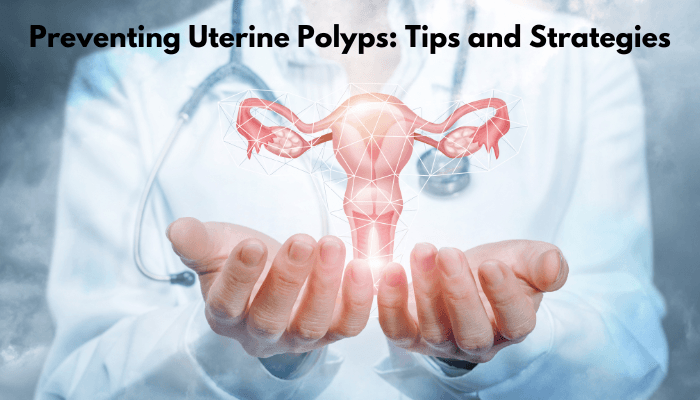Are you looking to take control of your reproductive health and prevent potential issues before they start? Uterine polyps, though often benign, can cause discomfort and complications like irregular periods, heavy bleeding, and even fertility problems. The good news is that there are simple and effective ways to reduce your risk.
In this blog, Dr. Pankhuri Gautam, a renowned gynecologist in Jaipur with years of experience in women’s health, shares practical tips and strategies to help you prevent uterine polyps and maintain a healthy, vibrant life.
5 Tips for Preventing Uterine Polyps
1. Maintain a Healthy Weight
Maintaining a healthy weight is crucial for hormonal balance, significantly preventing uterine polyps. Excess body fat can lead to an overproduction of estrogen, a hormone that stimulates the growth of the uterine lining and potentially leads to the formation of polyps.
Here are Practical Steps for Weight Management:
- 1 Eat a balanced diet with fruits, vegetables, whole grains, lean proteins, and healthy fats.
- 2 Get at least 30 minutes of physical activity daily, like walking, jogging, or cycling.
- 3 Drink plenty of water to support your metabolism.
- 4 Consider talking to a nutritionist for a personalized weight plan.
2. Regular Exercise
Regular exercise helps maintain hormonal balance by managing body weight, reducing stress, and improving insulin sensitivity. These factors contribute to regulating estrogen and progesterone levels, which is crucial in preventing the development of uterine polyps.
Here are the Types of Exercises and Recommended Routines:
- 1 Daily engage in 30 minutes of daily activities like walking, jogging, cycling, or swimming.
- 2 Include weight lifting or resistance exercises 2-3 times a week.
- 3 Practice yoga and stretching twice a week to reduce stress.
- 4 Add Pilates or similar workouts 2-3 times a week to strengthen core muscles.
3. Healthy Diet
A balanced diet rich in fruits, vegetables, and whole grains provides essential vitamins, minerals, and antioxidants, which help regulate hormones and maintain a healthy weight. This hormonal balance reduces the risk of uterine polyps.
Here are Nutrients That May Help Prevent Uterine Polyps:
- 1 Fibre: Helps regulate hormones by aiding in eliminating excess estrogen.
- 2 Antioxidants: They reduce inflammation and support cellular health in fruits and vegetables.
- 3 Omega-3 Fatty Acids: In fish, flaxseeds, and walnuts, they help balance hormones and reduce inflammation.
4. Limit Alcohol and Avoid Smoking
Excessive alcohol consumption can disrupt hormone levels, particularly estrogen, increasing the risk of uterine polyps. Smoking has been linked to various reproductive health issues, including an increased risk of developing uterine polyps.
Here are Some Strategies for Reducing Alcohol Consumption and Quitting Smoking:
- 1 Keep alcohol intake moderate, ideally no more than one daily drink.
- 2 Replace alcohol and smoking with healthier habits, like drinking herbal teas and staying active.
- 3 Seek help from healthcare providers for quitting smoking and reducing alcohol consumption.
- 4 Avoid situations that trigger smoking or excessive drinking.
5. Manage Stress
Chronic stress disrupts hormonal balance by increasing cortisol levels, which can affect oestrogen and progesterone. Maintaining good mental health helps regulate these hormones, reducing the risk of developing uterine polyps.
Here are some Techniques for Stress Management:
- 1 Practice mindfulness meditation to reduce stress.
- 2 Engage in yoga and relaxation exercises regularly.
- 3 Use deep breathing techniques to calm your mind.
- 4 Organise your tasks to reduce stress and avoid feeling overwhelmed.
- 5 Talk to friends, family, or support groups to share feelings and reduce stress.
5 Strategies for Preventing Uterine Polyps
1. Regular Medical Check-ups
Regular medical check-ups are important for early detection and prevention of uterine polyps because they help identify potential issues and ensure optimal reproductive health.
- – Visit your gynecologist regularly for check-ups.
- – Use screening tests like ultrasounds and pelvic exams.
- – Get professional advice on maintaining reproductive health.
2. Hormonal Balance Management
Understanding the role of hormones in uterine polyp development is crucial for effective prevention.
- – A balanced diet of fruits, vegetables, and whole grains supports hormonal health.
- – Engaging in regular physical activity helps regulate hormones naturally.
- – Ensure sufficient sleep to maintain the body’s natural hormonal rhythms.
- – Practice stress-reducing techniques such as yoga and meditation to support hormonal balance.
- – Consult your doctor when hormonal imbalances are suspected.
3. Managing Underlying Health Conditions
Managing underlying health conditions is essential in reducing the risk of uterine polyps.
- -Regularly check and manage high blood pressure.
- – Keep blood sugar levels under control with diet, exercise, and medication.
- – Address chronic uterine infections promptly.
- – Maintain a healthy weight to avoid obesity-related risks.
Work with your healthcare team to manage conditions that may contribute to polyp growth.
4. Education and Awareness
Staying informed and educated about reproductive health is key to preventing uterine polyps.
- – Learn about uterine polyps, their symptoms, and their potential impact on health.
- – Be aware of risk factors such as age, obesity, and hormone levels to assess your risk.
- – Discussions about reproductive health with friends, family, and healthcare providers.
5. Regular Screening and Early Intervention
Regular screenings and early intervention are vital in preventing and managing uterine polyps effectively.
- – Schedule regular pelvic exams, ultrasounds, and hysteroscopies to detect uterine polyps early.
- – If polyps are detected, follow your doctor’s advice. Treatment may include medication or surgery.
- – Continue monitoring to ensure polyps don’t come back and to keep your uterine health in check.
- – Develop a personalized health plan to manage your reproductive health effectively.
Conclusion
Taking charge of your health is crucial for a happy and healthy life. Staying informed and getting regular check-ups can help you prevent issues like uterine polyps before they become serious. Early detection and prompt treatment are key to avoiding complications and staying well.
Following these preventive tips can lower your risk and improve your long-term health. I, Dr. Pankhuri Gautam, encourage you to Visit my gynecology Clinic in Nirman Nagar, Jaipur, for personalized care and expert advice on maintaining your reproductive health.



